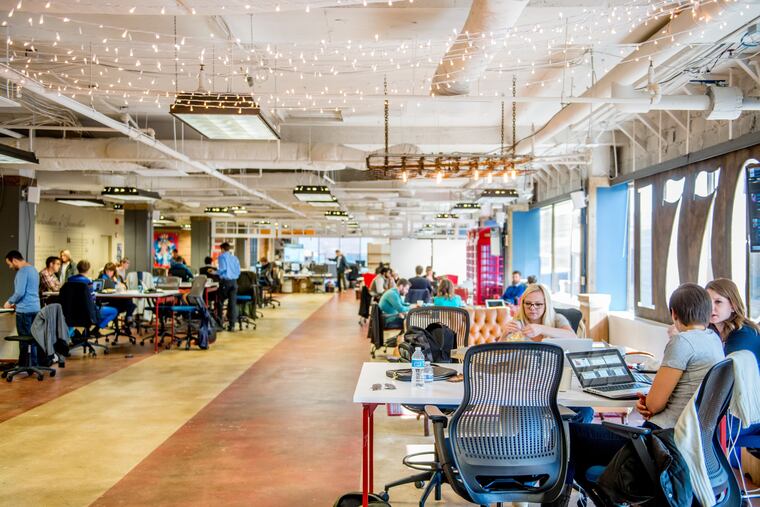In a sign of how malls are evolving, incubator 1776 is coming to the Cherry Hill Mall
The new space points to a trend of malls hoping to be more than a place to buy only clothes

An incubator space is coming to Cherry Hill Mall — a change that points to the broader trend of shopping centers rebranding as destinations to do more than just buy clothes.
Incubator company 1776 will occupy 11,000 square feet of the 1.3-million-square-foot Cherry Hill Mall, one of the 21 mall properties owned by Pennsylvania Real Estate Investment Trust (PREIT). The space is expected to open in November and 1776 considers it more of an "incubator" than a coworking space, providing resources for desk, office, and conference rooms in addition to entrepreneur-centered programming and mentorship, said Penny Lee, the company's chief strategy officer.
This is the first time 1776 is opening a space in a mall and the first time one of PREIT's malls will house a coworking and incubator space. Other 1776 campuses in Washington and Philadelphia, among others, are mostly located in office spaces, and the company is hoping that the Cherry Hill Mall location will provide entrepreneurs the opportunity to work more closely with customers.
"As retail is changing, as e-commerce is changing, we felt that it made sense to be able to put an incubator in an area, or a mall, that directly works with consumers and retailers, to not only give them a space to build and grow a company, but to test those products on customers," Lee said.
Joseph F. Coradino, PREIT's CEO, said 1776's new location "speaks to the possibilities that exist within a mall to sort of step outside the box."
There's been a "complete transformation" in terms of what retailers are inside of malls, Coradino said. "It's a different game. It's a different business." He called partnering with 1776 "a wave of the future," and added, "You will begin to see more of this in our industry."
1776 views its customer base as a wide range of entrepreneurs in the retail industry, beyond goods and products, Lee said, adding that the space could be for someone working on an artisanal product to someone looking to solve a problem in retail through technology. Pricing has not yet been determined, she said.
"It's a company that works with founders, start-ups, small businesses, to be able to help incubate your idea and to be able to propel it to another level or give you the resources and tools to take, to propel, it to a level of greater success," Lee said.
PREIT has already diversified the types of retailers in its malls, Coradino said, pointing to more than 20 percent of space now devoted to dining and entertainment and 13 percent of space leased for future openings with health-and-fitness tenants. The company has repurposed two dozen department stores across its portfolio to include off-price brands, grocers, movie theaters, and bowling and arcade venues, among others, according to Heather Crowell, the company's senior vice president for strategy and communications.
"Coworking and business incubation will become a regular part of our business going forward," Coradino said.
Malls across the country are looking to attract tenants different from the traditional department store to become a place where people can live, work, and play, according to a 2017 JLL report that studied 90 malls that were undergoing or completed renovations since 2014. Of those malls, the JLL analysis found that 30 percent started to add nonretail tenants, such as apartments, hotels, and office spaces.
"Nonretail amenities create a halo effect, driving new traffic to existing retailers," the JLL report says. "So now traditional mall owners are not just focusing just on retail, but are expanding by creating synergies with other uses."
"Despite our age of technology and growing obsession with social media, we still put a large emphasis on the importance of place and a sense of community," the JLL report says. "Malls are beginning to tap into this shift in consumer experience and are redeveloping properties to encourage a critical mass of interactions to be a self-sustaining 'downtown.'"
Though an increase of coworking spaces opening in malls isn't widespread, Steven H. Gartner, the executive vice president of global retail services at CBRE Inc. wrote in an email, it can attract traffic to an area because those using the space are frequent visitors who are likely to eat and shop there too.
"It's not really a torrent yet, as most coworking seeks to be in traditional office areas and mostly urban downtowns," he wrote. "But they are now finding appeal in accessible suburbs now."
Bespoke, a coworking, event and demonstration space that opened at the Westfield San Francisco Centre in 2015, may be an example of how a space such as 1776 could fare in a mall environment. Forbes reported in 2016 that Bespoke brought an estimated 100,000 additional visitors to the shopping center in its first year.
Lauren Gilchrist, senior vice president of research for JLL Philadelphia, said a mall attracting a tenant such as 1776 is part of the ongoing diversification of uses within a shopping center, and at the same time, a mall could be a great location for 1776 because it provides those using the space a "baked-in opportunity for entertainment in the form of shopping or also for lunch." She called the mall and incubator/coworking partnership "a great co-tenant for that type of environment."
"It's just an interesting and evolving space that everyone should be paying attention to," Gilchrist said. "This could potentially be a sign of things to come, so watch it carefully."